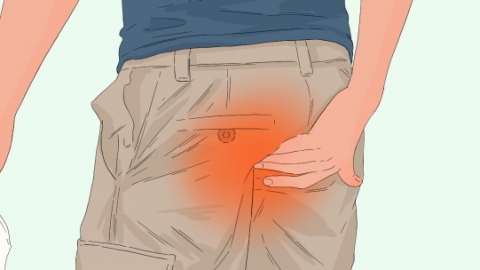What to do about itchy hemorrhoids
Under normal circumstances, anal itching may be related to poor anal hygiene, improper diet, allergies, eczema, anal fissures, and other conditions. Patients can relieve symptoms by cleaning the anal area, maintaining a bland diet, and receiving medication treatment. The specific analysis is as follows:

1. Poor anal hygiene: If personal hygiene habits are poor, such as not cleaning the anal area in a timely manner, residual feces and bacteria can irritate hemorrhoids, causing itching. It is recommended to keep the anal area clean, wash the anal area with warm water while showering daily, and avoid using harsh soaps or cleansers.
2. Improper diet: Consuming excessive spicy and irritating foods like chili peppers and Sichuan peppercorns may irritate hemorrhoids, subsequently causing itching, pain, and other adverse reactions. It is recommended to maintain a bland diet, consume more fiber-rich foods like celery and corn, and avoid spicy, greasy, and irritating foods.
3. Allergy: Recurrent hemorrhoids may damage the skin barrier function around the anus, making the skin more susceptible to external irritants and allergens, thus triggering allergic reactions, which may be accompanied by erythema, papules, and edema. Under a doctor's guidance, anti-allergy medications such as cetirizine hydrochloride tablets, fusidic acid cream, and loratadine tablets can be used for treatment.
4. Eczema: Local recurrent bleeding and failure to change undergarments timely may easily induce perianal eczema in patients. Common symptoms include local itching, blisters, pricking pain, and may be accompanied by blisters, exudation, and crusting. Under a doctor's guidance, medications such as tacrolimus ointment, calamine lotion, and boric acid solution can be used to relieve itching and reduce inflammatory responses.
5. Anal fissure: Anal fissure refers to a tear in the anal canal skin and mucosa, commonly seen in patients with constipation. During defecation, excessive pressure on the anus causes the tear, resulting in itching, accompanied by severe pain during defecation and sometimes bleeding. Patients need to promptly follow medical advice to use medications such as erythromycin ointment, hydrocortisone butyrate cream, and glyceryl trinitrate ointment for treatment.
In daily life, attention should be paid to maintaining a reasonable diet, adequate water intake, avoiding prolonged sitting, exercising regularly, and practicing proper anal hygiene as preventive measures to reduce the risk of anal itching associated with hemorrhoids.




